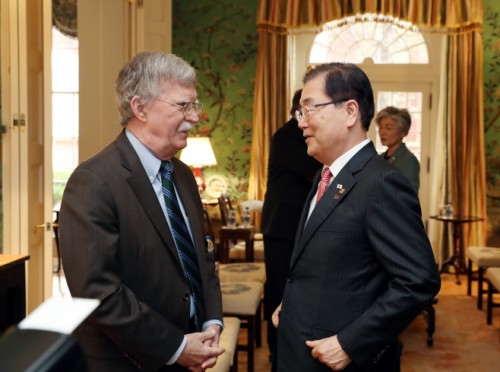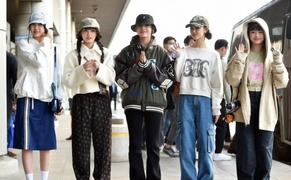 |
| This photo, taken April 11, 2019, shows presidential National Security Office (NSO) chief Chung Eui-yong (right) talking with his US counterpart, John Bolton, at Blair House in Washington D.C./ Source: Yonhap News |
By AsiaToday reporter Hong Sun-mi & Washington correspondent Ha Man-joo
US National Security Adviser John Bolton left for South Korea and Japan on Saturday. During his visit, he is likely to convey concerns about the deepening trade dispute between its two key regional allies and possible negative impact on the trilateral coordination for regional security.
Bolton’s visit to South Korea and Japan came a day after US President Donald Trump hinted at his willingness to help resolve escalating tensions between South Korea and Japan, sparked by Tokyo’s export curbs against Seoul. Besides, Washington has started to have concerns since the trade dispute is now spreading to economic and security issues beyond the past history and territorial issues.
Bolton will arrive in Seoul Tuesday for a two-day visit for talks with top Korean officials, including presidential National Security Office (NSO) chief Chung Eui-yong, Foreign Minister Kang Kyung-wha and Defense Minister Jeong Kyeong-doo, Cheong Wa Dae spokesperson Ko Min-jung said on Sunday. The question of how Bolton would settle discord between its key allies in the region became a pressing matter.
White House National Security Council spokesman Garrett Marquis said on Twitter that Bolton “departed Saturday for Japan and South Korea to continue conversations with critical allies and friends.”
Reuters reported that Bolton will visit Japan and South Korea as the two countries are in a middle of a trade dispute, and said Trump on Friday offered his help to ease tensions in the political and economic dispute between the United States’ two biggest allies in Asia, which threatens global supplies of memory chips and smartphones.
Speaking to the White House press corps in the Oval Office to mark the 50th anniversary of the Apollo 11 lunar mission, Trump revealed that President Moon Jae-in had made a request for him to mediate. Trump said he was willing to step in upon request from both leaders. Cheong Wa Dae spokesperson Ko Min-jung confirmed that Moon had made the request during his June 30 meeting with Trump in Seoul in an attempt to resolve the issue diplomatically.
Since Trump said he is ready to mediate “if the two allies seek help from Washington” and that they can “hopefully work it out”, the US is unlikely to immediately mediate to reduce trade tensions between the two countries. With Bolton’s visit however, Washington is expected to deliver its concerns and either get involved or try to mediate.
While discussing the trilateral coordination for regional security and the formation of an international military coalition to ensure free navigation in the Strait of Hormuz off Iran, Bolton is expected to express concerns to its two allies that the deepening feud between South Korea and Japan could have a negative impact on global strategies, such as the trilateral coordination on the North Korean and Iranian issues.
In fact, as many observers claim that Japan might take additional economic retaliation measures, Cheong Wa Dae said Friday that “all options are open” on the renewal of the bilateral General Security of Military Information Agreement (GSOMIA). The dispute that began with past affairs is now spreading to security sector.
#John Bolton #South Korea #Japan #visit #GSOMIA
Copyright by Asiatoday
Most Read
-
1
-
2
-
3
-
4
-
5
-
6
-
7





















